
Why Google’s ‘Who, How, Why’ Framework Matters for EEAT | NetusAI
Why Google’s ‘Who, How, Why’ Framework Matters for EEAT AI can create articles in seconds. But here’s the truth: speed is not enough. Google wants
Do You Trust AI-Generated Content? Exploring the Reliability
of Machine-Generated Articles

Content writer and editor for Netus.AI
Do You Trust AI-Generated Content? Artificial intelligence (AI) has revolutionized the way content is created, with AI-generated content becoming increasingly common. From news articles to social media posts, AI tools are being used to generate content at an unprecedented rate. While this technology has many advantages, it also raises questions about trust and authenticity.
In 2023, it was estimated that 33% of all content creation would be done by machines. This has led to concerns about the reliability of AI-generated content, particularly when it comes to news and other forms of information dissemination. How can we be sure that the content we are consuming is accurate and unbiased?
Trust is a key issue when it comes to AI-generated content. While machines can analyze vast amounts of data and produce content quickly, they lack the human touch that is necessary to build trust with readers. As AI continues to play a larger role in content creation, it will be important to find ways to ensure that the content we consume is trustworthy and reliable.
Generative AI has revolutionized the way content is created. AI tools such as ChatGPT and OpenAI have made it possible to generate high-quality content with minimal human intervention. These tools are powered by large language models that have been trained on vast amounts of data.
Content generators are another type of AI tool that has gained popularity in recent years. These tools can generate a wide range of content, including articles, blog posts, and social media posts. Content generators are designed to save time and effort, making them a popular choice for businesses and individuals who need to create large amounts of content quickly.
Large language models such as GPT have played a significant role in the evolution of AI content creation. These models are trained on vast amounts of data and can generate high-quality content that is almost indistinguishable from content written by humans.
The GPT language model family, in particular, has gained widespread popularity in recent years. These models have been used to generate a wide range of content, including news articles, product descriptions, and social media posts. The GPT models are constantly evolving, and their capabilities are expanding with each iteration.
In conclusion, the landscape of AI content creation is constantly evolving. Generative AI and content generation tools have made it possible to create high-quality content with minimal human intervention. Large language models such as GPT have played a significant role in this evolution and are likely to continue to do so in the future.
AI-generated content has several advantages over human-generated content. First, it can produce large amounts of content in a short period of time, which can be useful for businesses that need to produce a high volume of content. This can help increase productivity and reduce costs.
Second, AI-generated content can be more accurate and consistent than human-generated content. AI algorithms can analyze data and produce content that is free of errors and biases. This can help improve the quality of content and reduce the risk of misinformation.
Third, AI-generated content can be customized to meet the needs of specific audiences. AI algorithms can analyze data on consumer preferences and produce content that is tailored to their interests. This can help improve engagement and increase conversions.
While AI-generated content has many advantages, there are also potential drawbacks and risks to consider. First, AI-generated content may lack creativity and originality. It may also lack the human touch that can make content more engaging and relatable.
Second, there is a risk that AI-generated content may contain errors or biases. AI algorithms are only as good as the data they are trained on, and if the data is biased or incomplete, the content generated by the algorithm may reflect those biases.
Third, there is a risk that AI-generated content may contribute to the spread of misinformation. AI algorithms can be used to create fake news or propaganda, which can be difficult to detect and counteract.
Overall, while AI-generated content has many advantages, it is important to consider the potential drawbacks and risks before relying solely on AI for content creation.
As AI-generated content becomes more prevalent, ensuring its trustworthiness and authenticity becomes increasingly important. There are several ways to achieve this, including transparency in AI-generated content and maintaining intellectual property and credibility.
Transparency is crucial in ensuring trustworthiness and authenticity of AI-generated content. It is essential to disclose the use of AI in content creation, as well as the specific algorithms used. This information can help readers understand how the content was generated and make informed decisions about its credibility.
To achieve transparency, content creators can provide a disclaimer at the beginning of the content, highlighting the use of AI in its creation. Additionally, they can provide information about the data sets used to train the AI algorithms and the methods used to validate the content’s accuracy.
Maintaining intellectual property and credibility is also important in ensuring the trustworthiness and authenticity of AI-generated content. Plagiarism and unauthorized use of copyrighted material can undermine the credibility of the content and damage the reputation of the creator.
To avoid these issues, content creators can use plagiarism detection tools to ensure that their content is original and does not infringe on the intellectual property of others. Additionally, they can use watermarks or other forms of digital authentication to establish ownership and prevent unauthorized use.
In conclusion, ensuring the trustworthiness and authenticity of AI-generated content is essential for maintaining credibility and establishing trust with readers. By promoting transparency and maintaining intellectual property, content creators can create high-quality content that readers can trust.
As artificial intelligence (AI) continues to advance, more businesses are incorporating it into their content marketing strategies. By using AI, companies can create more efficient and effective marketing materials that can help them reach a wider audience. Here are two ways that AI can be integrated into content marketing strategies.
One of the main benefits of using AI in content marketing is that it can help businesses optimize their content for search engines. AI algorithms can analyze search engine data and identify the keywords and phrases that are most likely to drive traffic to a website. By incorporating these keywords into marketing materials, businesses can improve their search engine rankings and attract more visitors to their site.
AI can also help businesses create more effective product descriptions. By analyzing customer data, AI algorithms can identify the features and benefits that are most important to customers. This information can then be used to create product descriptions that are more likely to resonate with potential customers.
While AI can be a powerful tool for content marketing, it is important to balance its use with human creativity. AI algorithms can analyze data and generate content quickly, but they may not always be able to capture the nuances of human language and emotion.
To strike the right balance between AI efficiency and human creativity, businesses can use AI to generate initial drafts of marketing materials, which can then be refined and edited by human writers. This approach can help businesses create marketing materials that are both efficient and engaging.
In conclusion, AI can be a valuable tool for businesses looking to improve their content marketing strategies. By optimizing their content for search engines and balancing AI efficiency with human creativity, businesses can create more effective marketing materials that can help them reach a wider audience.
As AI-generated content becomes more prevalent, it is important to evaluate its quality and relevance. One way to do this is to assess the accuracy and consistency of the information presented. This can be done by comparing the AI-generated content with other sources and checking for any discrepancies or errors.
Another important factor to consider is the context in which the AI-generated content is being used. For example, if the content is being used for educational purposes, it should be evaluated based on its ability to convey information clearly and effectively. On the other hand, if the content is being used for marketing purposes, it should be evaluated based on its ability to engage and persuade the target audience.
When it comes to AI-generated content, there are ethical considerations that must be taken into account. For example, there may be concerns about bias and discrimination if the AI algorithms are not designed to be inclusive and diverse. Additionally, there may be concerns about the ownership and provenance of the content, as well as the potential for copyright infringement.
To address these concerns, it is important to follow best practices for AI-generated content. This includes ensuring that the algorithms used are transparent and explainable, so that users can understand how the content was generated. It also involves using high-quality data sources and regularly monitoring and updating the algorithms to ensure that the content remains accurate and relevant.
Overall, while AI-generated content has the potential to be a valuable tool, it is important to approach it with a critical eye and evaluate it based on its quality, relevance, and ethical considerations. By doing so, we can ensure that AI-generated content is used in a responsible and effective manner.

Why Google’s ‘Who, How, Why’ Framework Matters for EEAT AI can create articles in seconds. But here’s the truth: speed is not enough. Google wants
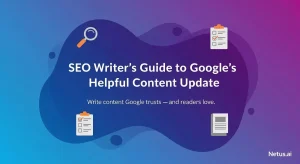
SEO Writer’s Guide to Google’s Helpful Content Update Keeping up with Google’s algorithm changes can feel like a relentless game of whack-a-mole. Just when you
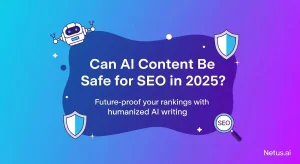
Can AI Content Be Safe for SEO in 2025? Let’s start with the question of keeping every content strategist, SEO pro and blogger awake at
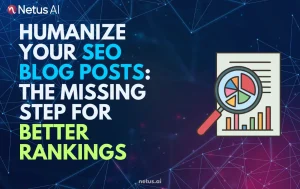
Humanize Your SEO Blog Posts: The Missing Step for Better Rankings You’ve done everything by the book. Your keyword research is impeccable. Your meta descriptions
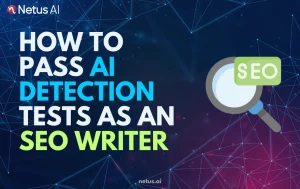
How to Pass AI Detection Tests as an SEO Writer Let’s paint a familiar picture. You’ve just finished a blog post. The headline is sharp,
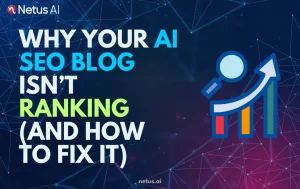
Why Your AI SEO Blog Isn’t Ranking (And How to Fix It) You embraced AI for your blog. The promise was intoxicating: high-quality content, published
@ 2024 Netus AI.